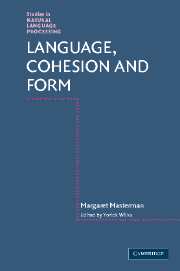Book contents
- Frontmatter
- Contents
- Preface
- Editor's introduction
- Part 1 Basic forms for language structure
- 1 Words
- 2 Fans and Heads
- 3 Classification, concept-formation and language
- Part 2 The thesaurus as a tool for machine translation
- Part 3 Experiments in machine translation
- Part 4 Phrasings, breath groups and text processing
- Part 5 Metaphor, analogy and the philosophy of science
- Bibliography of the scientific works of Margaret Masterman
- Other References
- Index
1 - Words
Published online by Cambridge University Press: 22 September 2009
- Frontmatter
- Contents
- Preface
- Editor's introduction
- Part 1 Basic forms for language structure
- 1 Words
- 2 Fans and Heads
- 3 Classification, concept-formation and language
- Part 2 The thesaurus as a tool for machine translation
- Part 3 Experiments in machine translation
- Part 4 Phrasings, breath groups and text processing
- Part 5 Metaphor, analogy and the philosophy of science
- Bibliography of the scientific works of Margaret Masterman
- Other References
- Index
Summary
To the question ‘What is a word?’ philosophers usually give, in succession (as the discussion proceeds), three replies:
‘Everybody knows what a word is.’
‘Nobody knows what a word is.’
‘From the point of view of logic and philosophy, it doesn't matter anyway what a word is, since the statement is what matters, not the word.’
In this paper I shall discuss these three reactions in turn, and dispute the last. Since it is part of my argument that the ways of thinking of several different disciplines must be correlated if we are to progress in our thinking as to what a word is, I shall try to exemplify as many differing contentions as possible by the use of the word ward, since this word is a word which can be used in all senses of ‘word’, which many words cannot.
Two preliminary points about terminology need to be made clear. I am using the word ‘word’ here in the type sense as used by logicians, rather than in the token sense, as synonymous with ‘record of single occurrence of pattern of sound-waves issuing from the mouth’. Thus, when I write here ‘mouth’, ‘mouth’, ‘mouth’, I write only one word.
The second point is that I use in this paper, in different senses, the terms ‘Use’, ‘usage’ and ‘use’. The question as to how the words ‘usage’ and ‘use’ should be used is, as philosophers know, a very thorny one.
- Type
- Chapter
- Information
- Language, Cohesion and Form , pp. 21 - 38Publisher: Cambridge University PressPrint publication year: 2005
- 1
- Cited by

